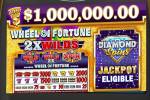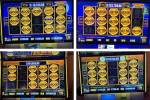Macau may get tighter scrutiny
HONG KONG — Members of a congressional advisory panel believe U.S. regulators should tighten scrutiny of casino companies operating in Macau, the world’s top gambling market, because of the risk of money laundering.
“We need to go deeper into this,” said Michael Wessel, a member of the U.S.-China Economic and Security Review Commission, which heard testimony in Washington on Thursday.
“I’m not sure the companies are looking as deep as they need to in their own organizations and the profits are driving their activities. It’s worth some stricter scrutiny.”
The commission was set up in 2000 to examine national security implications of the trade and economic relationship between China and the U.S. and make recommendations to Congress.
Nevada-based Las Vegas Sands Corp., Wynn Resorts Ltd. and MGM Resorts International are among six operators that have shared in the casino boom in Macau, the only place in China where gambling is legal. The former Portuguese colony earned
$38 billion in gambling revenue last year, about six times more than the Strip.
Most of Macau’s gambling revenue comes from the tens of millions of mainland Chinese gamblers who visit each year. However, the central government in Beijing imposes strict capital controls that limit the amount of money that can be taken out of mainland China to 20,000 yuan ($3,200) per trip.
To get around these controls, wealthy Chinese gamblers use so-called junket agents who arrange for them to travel to Macau, visit private VIP rooms, lend them money for their bets and collect on debts. VIP gamblers account for about two-thirds of Macau’s total gambling revenue.
“The structure of the casino system in Macau effectively allows people to use the casinos to circumvent these capital controls,” Commission Chairman William Reinsch said in opening remarks.
State and federal regulators want to make sure casino companies “do not get drawn into activities that would be considered illegal or improper in the United States,” he said.
A.G. Burnett, chairman of the Nevada State Gaming Board, testified that it is “common knowledge that the operation of VIP rooms in Macau casinos had long been dominated by Asian organized crime, commonly referred to as triads.”
He said the casinos themselves may not be aware of illegal transactions.
“Criminal transactions are widely alleged to take place just out of the direct purview of the casino,” he said.
The commission’s concerns come as Sands and Wynn face investigations from U.S. authorities over their activities in Macau. The two companies earn most of their profits from the tiny gambling enclave, an hour from Hong Kong by high-speed ferry.
Spokespeople for Sands’ and Wynn’s China units declined to comment. Macau’s gambling regulator and a spokesperson for MGM China did not reply to a request for comment.
Burnett said that U.S. casino companies have strong compliance programs in Macau to make sure there are “no nefarious activities” in their operations. He said the influence of the junket operators in Macau may be waning and that the casinos may not have to rely on them so much in the future to bring in wealthy gamblers.
When asked whether Nevada regulators had ever seen any organized crime at U.S. casinos in Macau, including at VIP rooms, or had taken any disciplinary action against a casino for violations there, he said they had not.
Burnett said that U.S. casinos had already suffered “to some extent” because they are required to cover the Nevada regulators’ expenses, including dispatching staff to Macau to meet their counterparts and check operations.
“Travel to China is not cheap,” Burnett said. “We are routinely sending agents there now.”




























